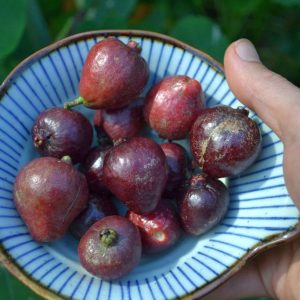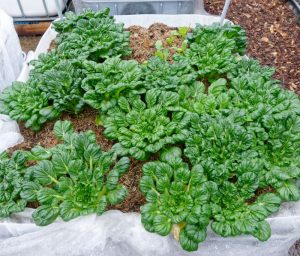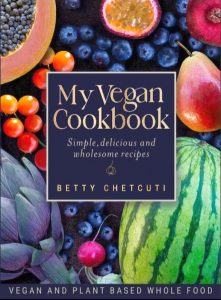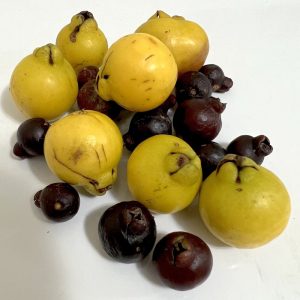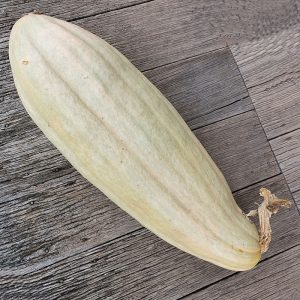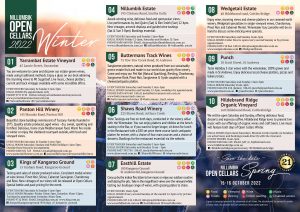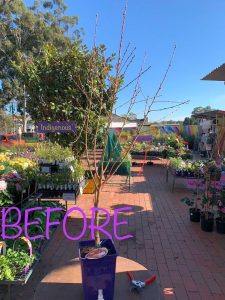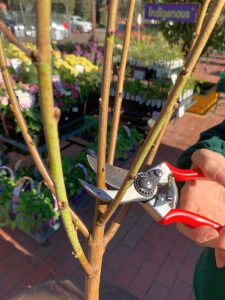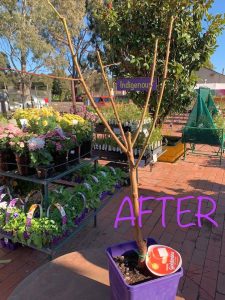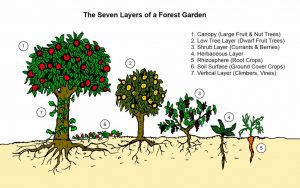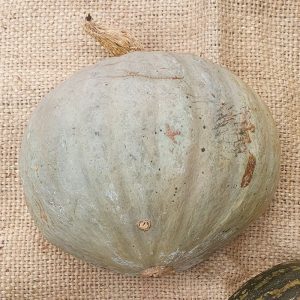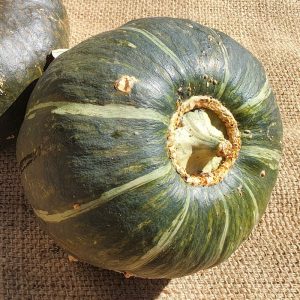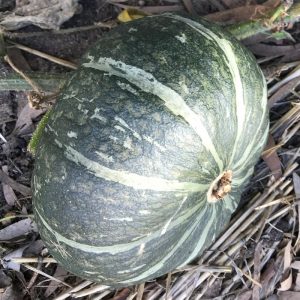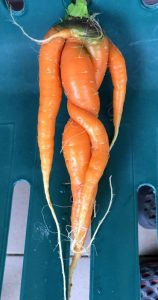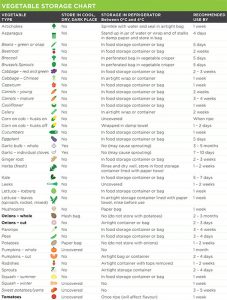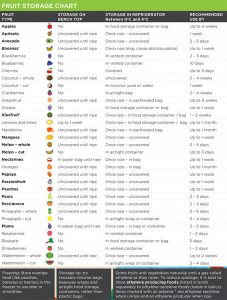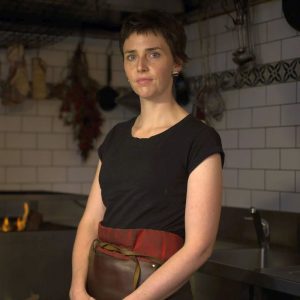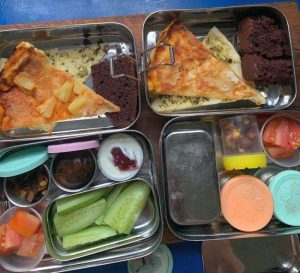Thanks to the people who have contributed to this week’s newsletter: Alison Raven, Ann Stanley, Anna Matilda, Bruno Tigani, Carol Woolcock, Choon yin Yeok, Emma Duncan, Jan Connor, Lynette Mackenzie, Meg Montague, Megan Goodman, Nancy Mills and Robin Gale-Baker.
If you are Gmail user and didn’t successfully receive our newsletter last week, read this short guide on how to stop Google’s blocking of our future newsletters.
The more people who contribute material, the better this newsletter. If you have any interesting news, tips, photos or questions, email them to us.
How to grow lettuce (and other salad greens) by Robin Gale-Baker
[Presented below is a shortened version of Robin’s new article about growing lettuce (and other salad greens).]
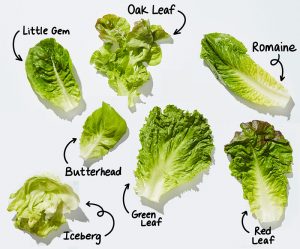 [Editor: Lettuce comes in a variety of types, including iceberg (tight head), butterhead (loose head), looseleaf (no head) and cos/romaine. I usually grow looseleaf as it is the easiest to harvest leaf by leaf rather than having to harvest the whole plant at the same time. Here is an article about the various types of lettuce and other salad greens, and how to use them.]
[Editor: Lettuce comes in a variety of types, including iceberg (tight head), butterhead (loose head), looseleaf (no head) and cos/romaine. I usually grow looseleaf as it is the easiest to harvest leaf by leaf rather than having to harvest the whole plant at the same time. Here is an article about the various types of lettuce and other salad greens, and how to use them.]
As well as the various types of lettuce, other salad greens include corn salad, rocket/arugula, mustard greens, cress, watercress, mizuna, radicchio, endive, baby spinach and baby silverbeet. Some of these, along with sunflower, kale and peas, can be grown as microgreens. Add in herbs and edible flowers and create salads with a great range of colours, textures and flavours.
Robin’s first tip for growing lettuce is to use seed that is less than a year old because it loses its viability quickly after that. Lettuce germinates best at temperatures around 21C but poorly below 10C and above 26C. Plant year round.
Robin’s second tip is to germinate the lettuce seed in the light (i.e. do not cover with soil). Lettuce can be sown either directly or in punnets for later transplanting. If sown directly, they will need thinning. Spacing depends on the variety, and can vary from 10cm to 45cm, so follow the instructions on the seed packet.
Robin’s third tip is to keep the seed well watered until rooted. Any drying out will kill the seed. Spread the seed onto a firmed, watered seed bed, press the seed onto the surface, and check every day that it is still moist. Water well if not until the seed has germinated and is rooting into the soil bed. After this, keep the seedlings damp but not wet. When transplanting seedlings, water in with Maxicrop or Seasol to reduce shock. As lettuces are shallow rooted, they will continue to need regular watering or they will become tough and bitter. Water regularly every second day in summer and keep moist at all times to prevent bolting.
Robin’s final tip is to grow in well prepared soil containing compost and nitrogen. Lettuces are heavy feeders. Dig the soil over so it is loose and weed free, and incorporate compost, nitrogen (e.g. poultry manure) and potash (potassium) in the top layer for best results. The pH should be 6-6.8.
Why depend on the supermarket when food is free? (by Ann Stanley)
The ABC have been reporting that a lettuce can currently cost more than $10. And some people have told me that, since the current inflation started, they are having to restrict what they can buy at the supermarket. So I thought I’d share some hopefully reassuring pictures of the free vegetables that we (my husband and I) currently have growing, or lying around, at our place in Warrandyte. Please note that my garden is best described as overgrown, and my gardening style is unscientific, sporadic, and haphazard. There’s nothing here that you can’t do!)
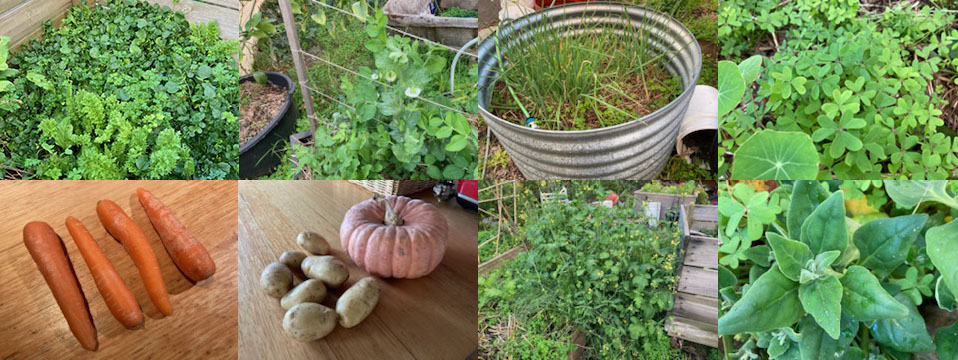
Clockwise from top left in the photo:
- A metre square fruit box that had about ten centimetres of compost in it, left over from when it was a compost bin. At the end of last season, I threw seeds from the garden in it randomly. The rain fell on it (thank you La Niña) and up sprouted a lot of green leafy vegetables. Some of the leaves are hot and spicy and some are bitter, but the cooking and other ingredients seem to reduce these tastes to almost nothing.
- Snow peas from seedlings traded at the Warrandyte Food Swap.
- Egyptian walking onions grown from last year’s bulbs. These videos explain how.
- Oxalis. A weed, obviously, but flavoursome. Don’t eat too much. I’d show you a picture of how much of this I have, but I’m too embarrassed.
- Warrigal greens. Grows weedily, seeds prolifically. Blanch before eating. Read Pam Jenkins’ recipe.
- An overgrown crop of rocket (or roquette, if you prefer) that grew from last year’s overgrown crop of rocket that probably grew from the one before that.
- A pumpkin from the seeds of last year’s pumpkin plus potatoes from the eyes of last year’s potatoes.
- Carrots from Food is Free Warrandyte. Very fresh and crispy.
Yes, you did know!
What to do with medlars?
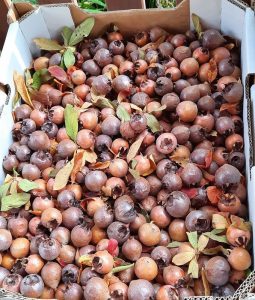 Last week, Liz Cronin, from Warrandyte Food Swap, asked what to do with medlars, including some recipes. (She asked because they have a lot to give away at their next swap on Saturday, 2nd July, 9-10am and want to provide some advice.) Several of you responded.
Last week, Liz Cronin, from Warrandyte Food Swap, asked what to do with medlars, including some recipes. (She asked because they have a lot to give away at their next swap on Saturday, 2nd July, 9-10am and want to provide some advice.) Several of you responded.
Alison Raven: “I gave the medlars to the food swap, so feel I should pass on what I know! They are from my parents’ tree (in Panton Hill) and in the past we have made medlar jelly and medlar ‘cheese’ (a paste really, that I have used in cake baking). They are pretty fiddly to prepare, because of the seeds, so it’s not surprising they went out of favour in this age of fast and easy food prep – they are definitely a ’slow food’! Here are some recipes: medlar cheese, medlar tart and medlar jelly.“
Anna Matilda (aka Urban Nanna) has pointed out that she wrote a comprehensive article about medlars last year, including details on bletting, ideas on how to use them once ready, and links to a couple of recipes.
Meg Montague has provided a link to a 2003 article in The Age entitled Strange fruit, which is about medlars. She also says that she has found that chutney gives the best result.
Emma Duncan: “Don’t transport them when they’re really ripe as they can explode with the slightest pressure!“
How to grow tatsoi
Last week, I asked for any tips about how to grow tatsoi, having seen this unusual and attractive vegetable for the first time at Oakhill Farm. Lots of you responded, all confirming that it is tatsoi.
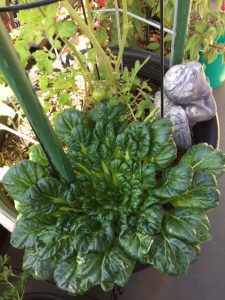
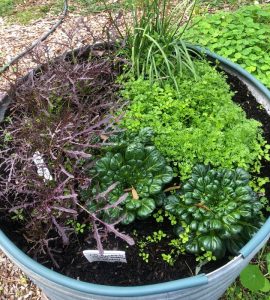
Nancy Mills: “My latest tatsoi (see picture above left) is self-sown – who doesn’t love a volunteer – and is much bigger than any I’ve deliberately planted. It appeared in a tomato pot during white cabbage butterfly season, withstood major attacks, and is now powering ahead. From my modest experience, I suggest planting tatsoi in early autumn and netting it during cabbage butterfly season – like other brassicas. It responds well to liquid fertiliser every two or three weeks.“
Carol Woolcock: “The tatsoi in my front tank is ready to harvest (see picture above right). Also, mizuna, garlic chives and carrots.“
Bruno Tigani: “Often tatsoi is grown at high density for baby leaf production, similar to how you grow baby spinach. It’s very easy to grow, year round from seed, direct sown. It’s fast to mature.“
Emma Duncan: “Grow like pak choy: cover to protect from white cabbage butterfly, full sun, well drained soil, water regularly. You can pick individual leaves from the outside. Use in salads.“
Ann Stanley: “Tatsoi tastes good and is nutritious. It is easy to grow straight into the ground from either seed or seedling.“
Choon yin Yeok: “You can buy tatsoi seedlings at many nurseries. They look good in my veggie patch. I stir fry them.“
Lynette Mackenzie: “I’m the volunteer looking after the veggies at Oakhill Farm. The keys to growing tatsoi are good soil, sunshine and water.“
Do you know?
What is wrong with these cumquats?
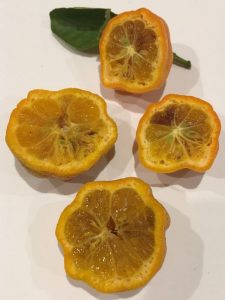
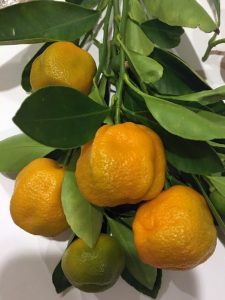 Jan Connor has written in: ““Can anyone identify what has happened with my current crop of cumquats (see the two pictures right)? About half of them are oddly misshaped, and their flesh is shrunken and light to dark brown in colour.” Email me with your replies.
Jan Connor has written in: ““Can anyone identify what has happened with my current crop of cumquats (see the two pictures right)? About half of them are oddly misshaped, and their flesh is shrunken and light to dark brown in colour.” Email me with your replies.
How to over winter tomato plants?
Nancy Mills has written in: “I am trying to overwinter a black cherry tomato plant. Can anyone offer any advice about how best to do this?” Email me with your replies.
The Moon Rabbit cafe is looking for glass jars
Moon Rabbit is a social-enterprise cafe operated by Bridge Darebin. They are currently trying to re-stock their glass jars for serving up their coffee and other hot drinks, and thus avoid using plastic cups. If you have any spare jars, take them to the cafe at 218 High Street, Preston. Note that they can only accept jars that are clean, free of labels, hold 200ml-500ml, are made of clear glass and have a lid.
Some Community Grocer closures
As discussed on their website, Community Grocer’s Carlton market has closed and their Heidelberg West market will be closed after 2nd July. Their Fitzroy market remains open.
Another article by Angelo Eliades
Why are citrus trees and other evergreens planted in Spring?
[Editor: so the general rules for fruit trees, berries and vines are:
- Plant evergreens in Spring (or, failing that, early Autumn).
- Plant deciduous in Winter.]
Read more of Angelo’s food-growing articles.
A video for you to watch
Ann Stanley suggests that you watch this 8 minute video about a group called the Kosgangsters, who are a local food co-operative in South Africa.
[Editor: one of my favourite pages on our website is our video page, which comprises around 40 carefully curated videos about food.]
Meg’s garden this month
The structure of the garden is revealing itself as the trees lose the last of their leaves. I have cut the grapevine back hard and pruned and tied the berry canes. The rain and cold has made the rhubarb leaves large and the stems thick and a bright red. I am looking forward to warm baked rhubarb this weekend (see recipe below).
It is also time to plant seed potatoes for harvest in early summer. This year I have selected reliable ‘King Edward’ and ‘Royal Blue’. Due to lack of space, I have planted them in one of the main veggie beds- always dangerous as I expect I will have potatoes popping up in that bed for years to come. It also means that the bed will be occupied for a long period of time- but when the reward is new potatoes why would that matter?
Rhubarb with vanilla
1 bunch rhubarb (about 750g)
1 cup orange juice
1 piece of orange peel
½ vanilla pod (or a little vanilla paste)
1 tablespoon brown sugar
Slice rhubarb into pieces about 5cm long and arrange in a single layer in an ovenproof dish.
Add the peel and vanilla, sprinkle over sugar and then pour over orange juice.
Bake at 160degC for 30-40 minutes or until rhubarb is soft but still retains its shape.
Read more of Megan Goodman’s other recipes on our website.
What veggie seeds to plant in July
Here is a list (see the July planting guide for more detail):
Beetroot
Coriander
Lettuce
Mizuna
Mustard greens
Onion
Peas
Radish
The shortest list of the year.
Not food related but interesting
There will be an art exhibition for environmental sustainability from the 1st to the 24th July at Lot275 Gallery, Ivanhoe Library & Cultural Hub, 275 Upper Heidelberg Road, Ivanhoe. The local artists will include newsletter reader Felicity Gordon. The opening night is Friday, 8th July, 5-7pm, at which you will receive (from Felicity, I think) a food plant seedling to take home.
 Joke (or pun) of the week
Joke (or pun) of the week
The waiter said to me, “I’m glad you enjoyed your dinner. How did you find the steak?”
I replied, “Super easy. It was right next to the potatoes.“
Regular activities over the coming week
Farmers’ markets
- Saturday: Abbotsford and Coburg.
- Sunday: Alphington, Carlton, Eltham and Heathmont.
Food swaps
- Saturday: Bayswater North, Brunswick East, Fitzroy, Heidelberg West and Warrandyte.
- Sunday: Blackburn, Montmorency and Regent (Reservoir).
Community gardens
- Thursday: Diamond Valley Library (Greensborough), Edible Hub (Hurstbridge), SEEDs (Brunswick) and Whittlesea.
- Friday: Reynard Street (Coburg) and West Brunswick.
- Saturday: Links (Lalor), Macleod, Renown (Coburg North) and Thrive (Diamond Creek).
- Sunday: Fawkner Food Bowls, Northcote Community, Pentridge (Coburg) and Regent (Reservoir).
- Monday: SEEDs (Brunswick) and Whittlesea.
- Tuesday: Watsonia Library.
- Next Wednesday: Living & Learning Eltham, Macleod, Newton Street (Reservoir), Sylvester Hive (Preston), Span (Thornbury) and The Patch (Bundoora).
Upcoming face-to-face events – introduction
You can view various calendars on our website by type of event: All once-off events, Cooking, Everything else and Free.
You can also view various calendars on our website by Council area: Banyule, Boroondara, City of Yarra, Darebin, Manningham, Maroondah, Moreland, Nillumbik, Whitehorse, Whittlesea and Yarra Ranges.
Upcoming face-to-face events – not cooking
Ageing in rural Nillumbik – let’s talk land management; Saturday, 23rd July, 11.30am-1pm; free; St Andrews.
Open Food Network is working in partnership with Nillumbik Council and Fair Share Fare on a project to explore how to keep farmland and food systems thriving as the landowners age. At this event, you will hear three people’s views on the subject: Lydia Heap (Smiths Gully General Store), Thanisa Adams and Mel Nelson (Dunmoochin Landcare). Then stay for lunch to catch up, connect, and chat further about the topic.
Mushroom foraging; Thursday, 11th August, 7-9pm; $85 ($43 per hour); Collingwood.
You will learn what spores are exactly and what their prints mean before moving on to tools and techniques for efficient and environmentally-conscious mushroom hunting and correct foraging etiquette. Then you will learn how to identify wild mushrooms, the common species that you’re likely to come across, which edible mushrooms you can use in cooking, and medicinal species, as well as hallucinogenic species, and the downright dangerous. Finally, you will learn about ways to cook mushrooms, preservation techniques and tincture preparation, before ending with a tasting of some wild mushrooms.
DIY mushrooms; Saturday, 20th August, 10am-4pm; $165 ($28 per hour); CERES.
Presenter: Buttons Mira from The Mushroomery. You will be shown the secrets to successfully growing mushrooms at home. You will learn the growing methods for oyster and shitake mushrooms, including inoculation and sterilisation, and be introduced to basic mycology. You will undertake practical sessions and learn how to start master cultures.
Bees in your backyard; Saturday, 20th August, 10-11am; free;; Balwyn.
Learn about native bees, pollination and increasing urban biodiversity with Katrina Forstner. Katrina will share her knowledge and skills to get you started in setting up a native bee friendly garden. You will also make a bee hotel to take home. Organised by Balwyn Library.
Compost and worm farms; Sunday, 21st August, 9.30-10.15am; $15 (reimbursable at the nursery); Diamond Creek.
Joel Watson will discuss whether you should have a compost bin, a compost bay, a worm farm or all three. He will also discuss how you create great compost and keep your worms alive. Organised by Nillumbik Nursery.
Growing mushrooms at home; Sunday, 21st August, 10am-12.30pm; $95 ($38 per hour); Alphington.
Presenter: Julia Laidlaw from Sporadical City Mushrooms. This hands-on, beginners workshop will cover basic oyster mushroom growing. It is a skill sharing ‘tips and tricks’ lesson from an experienced commercial mushroom grower who started growing very basically at home in a small space with no technical equipment in the inner city. You will take home your own mushroom growing kit that you have prepared during the workshop, the materials and instructions needed to prepare a kit at home (re-purposed plastic bucket & lid, oyster mushroom grain spawn, enough straw for a grow kit, bag for pasteurising straw, small bottle of isopropyl alcohol for sterilisation).
In July
- Winter fruit tree maintenance; Saturday, 2nd July, 9.30am-midday; $55 ($22 per hour); Bulleen Art & Garden.
- Food photography; Saturday, 2nd July, 2-5pm; $109 ($36 per hour); Eltham.
- Berries and vines with Angelo Eliades; Sunday, 3rd July, 10am-midday; $51 ($26 per hour); Preston.
- Introduction into wine masterclass; Sunday, 3rd July, 3-5pm; $32 ($16 per hour); Northcote.
- Pruning and care of fruit trees; Saturday, 9th July, 10am-3pm; $115 ($23 per hour); CERES.
- Urban food gardening (8 sessions); 8 consecutive Wednesdays from 13th July, 10am-2.30pm; $60 for all 8 sessions (Government subsidised fee); Eltham.
- Growing micro greens at home with Sustainable Gardening Australia; Thursday, 14th July, 6.30-7.30pm; free; Box Hill.
- Winter fruit tree pruning workshop; Saturday, 16th July, 9am-1pm; $75 ($19 per hour); Edendale.
- Much ado about compost; Saturday, 16th July, 10-11.30am; $59 ($40 per hour); Ringwood.
- Growing mushrooms at home; Saturday, 16th July, 10am-12.30pm; $95 ($38 per hour); Alphington.
- Organic propagation of vegetables and herbs; Saturday, 16th July, 10am-3pm; $115 ($23 per hour); CERES.
- Make beeswax wraps; Saturday, 16th July, midday-2pm; $10; Forest Hill.
- Introduction into wine masterclass; Saturday, 16th July, 3-5pm; $32 ($16 per hour); Northcote.
- Complete urban farmer (14 sessions); weekly, starting Thursday, 21st July, 9am-3pm; $880 ($10 per hour); CERES.
- Set up your own worm farm; Thursday, 21st July, 11am-midday; free; Greensborough.
- Fruit tree pruning and care; Thursday, 21st July, 7-8pm; free; Mill Park.
- Movie themed cocktail making class; Friday, 22nd July, 7-8.30pm; $95 ($64 per hour); Brunswick.
- Beeswax wraps; Saturday, 23rd July, 10am-midday; $75 ($38 per hour); CERES.
- The fungus amongst us; Saturday, 23rd July, 10am-12.30pm; $55 ($22 per hour); Alphington.
- Ageing in rural Nillumbik – let’s talk land management; Saturday, 23rd July, 11.30am-1pm; free; St Andrews.
- Beekeeping – how to get started; Sunday, 31st July, 9.30-10.45am; $20 (reimbursable at the nursery); Diamond Creek.
- Introduction to growing microgreens; Sunday, 31st July, 10am-midday; $60 ($30 per hour); Preston.
- Home brewing; Sunday, 31st July, 10am-3pm; $80 ($18 per hour); CERES.
In August
- Fruit tree pruning with Kaye Roberts-Palmer; Tuesday, 2nd August, 11am-12.30pm; free; Doncaster.
- Basic inoculation workshop; Saturday, 6th August, 10am-midday; $87 ($44 per hour); Alphington.
- Grafting and tree sales day; Saturday, 6th August, 10am-midday; free; CERES.
- Wicking bed wow; Saturday, 6th August, 10am-1pm; $189 ($38 per hour); Ringwood.
- Grafting and tree sales day; Sunday, 7th August, 9am-midday; free; Templestowe.
- Healthy productive compost and worms; Sunday, 7th August, 9.30am-12.30pm; $50 ($17 per hour); Bulleen Art and Garden Nursery.
- Herb planting workshop; Sunday, 7th August, 10-11.30am; $60 ($40 per hour); Park Orchards.
- In-depth mushroom cultivation workshop; Sunday, 7th August, 10am-4pm; $165 ($28 per hour); Alphington.
- Foundation to organic gardening course (3 sessions); on 3 consecutive Sundays from 7th August, 10am-1pm; $65 ($7 per hour); Richmond.
- Introduction to horticultural permaculture (4 sessions); on 4 consecutive Mondays from 8th August, 10am-2.30pm; $50 for all 4 sessions; Eltham.
- Care of backyard chickens; Thursday, 11th August, 11am-midday; free; Greensborough.
- Mushroom foraging; Thursday, 11th August, 7-9pm; $85 ($43 per hour); Collingwood.
- Growing fruit and veggies in small spaces; Sunday, 14th August, 9.30am-12.30pm; $50 ($17 per hour); Bulleen Art and Garden Nursery.
Regular events
- Bakery Hill whisky distillery tour and tasting; various Sundays, various times; $64 ($43 per hour); Bayswater North.
- Beekeeping workshop; roughly once a month; $85 ($34 per hour); Brunswick East.
- Carlton aperitvio food tour; various Fridays, 5-7pm; $89 ($45 per hour); Carlton.
- Cocktail workshop; Saturdays, at 2pm and again at 5pm; $55 ($37 per hour); Northcote.
- Flavours of Coburg food tour; various Saturdays, 10am-1pm; $49 ($16 per hour); Coburg.
- Ratio Cocoa Roasters behind the scenes chocolate factory tour; various Fridays and Saturdays; $15 ($10 per hour); Brunswick.
Upcoming face-to-face events – cooking
Cake decorating using coloured fondants; Sunday, 7th August, 1-4pm; $79 ($26 per hour); Surrey Hills.
Amanda will show you the basics of cake decorating using coloured fondants. You will design, mix colours and then ice and decorate a basic store-bought cake to take home. Organised by Balwyn Community Centre.
Italian kids cooking class; Thursday, 18th August, 4.30-6.30pm; $35 ($18 per hour); Surrey Hills.
Your child will learn how to make Italian pasta from scratch. When they are finished cooking, the group will sit down to enjoy their home-cooked dinner. The class is taught by Carmela. Organised by Balwyn Community Centre.
Demystifying bread; Thursday, 18th August, 6.30-9pm; $60 ($24 per hour); Park Orchards.
Nadine will demonstrate the technique of bread making and baking. Bring a container to take home your dough to bake at home. Suitable for beginners. Organised by Park Orchards Community House.
Gingerbread house workshop; Friday, 19th August, 6.30-8.30pm; $70 ($35 per hour); Park Orchards.
Decorate a gingerbread house using piping icing techniques, lollies and more. All material included and you walk away with your own decorated gingerbread house. Organised by Park Orchards Community House.
An artisan chocolate dessert class; Sunday, 21st August, 10am-1pm; $154 ($51 per hour); Alphington.
Nidhi, from Cocoa & Chili, will show you how to make ganache, hand rolled truffles, chai tiramisu and mascarpone filling.
Cheddar cheese making; Sunday, 21st August, 10am-5pm; $170 ($24 per hour); CERES.
What you will learn: how to make your own cheddar cheese; how to make ricotta cheese; and about different cheeses. Presenters: Janet Clayton and Charlene Angus from Cheeselinks.
Sri Lankan cooking class; Wednesday, 24th August, 6-9pm; $90 ($30 per hour); Surrey Hills.
Experience the tastes, smells and sounds of Sri Lankan cooking. You will make two different curries, coconut sambal and a side dish. Afterwards, you’ll sit down and enjoy a Sri Lankan feast. Organised by Balwyn Community Centre.
In June
- Pickling and fermentation workshop; Thursday, 30th June, 6.30-8.30pm; free; Watsonia.
- Kombucha brewing workshop; Thursday, 30th June, 7-11pm; $54 ($14 per hour); Brunswick.
In July
- Authentic Mexican; Saturday, 2nd July, 10am-3pm; $115 ($23 per hour); CERES.
- Sourdough bread making; Saturday, 9th July, 9am-midday; $61 ($20 per hour); Panton Hill.
- Tortelloni and ravioli class; Saturday, 9th July, 10am-1.30pm; $125 ($36 per hour); Thomastown.
- A Devonshire tea workshop (thermomix); Saturday, 9th July, 2-4pm; $15 ($8 per hour); Eltham.
- An artisan chocolate baking class; Sunday, 10th July, 10am-1pm; $154 ($51 per hour); Alphington.
- Middle Eastern cooking; Thursday, 14th July, 10.30am-1.30pm; $80 ($27 per hour); Park Orchards.
- Food for mind and gut; Saturday, 16th July, 10am-3pm; $115 ($23 per hour); CERES.
- Artisan bread making; Sunday, 17th July, 8am-2pm; $220 ($37 per hour); Abbotsford.
- Beginners cheese making class; Sunday, 17th July, 10am-3pm; $200 ($40 per hour); Thomastown.
- Truffle workshop at Ratio Cocoa Roasters; Sunday, 17th July, 11am-12.30pm; $75 ($50 per hour); Brunswick.
- Truffle and praline workshop; Wednesday, 20th July, 6-10pm; $180 ($45 per hour); Blackburn
- Sourdough bread baking; Saturday, 23rd July, 9am-5pm; $180 ($23 per hour); CERES.
- Feta and haloumi cheese making; Sunday, 24th July, 10am-4pm; $170 ($28 per hour); CERES.
- Cup cake bouquet workshop; Friday, 29th July, 6.30-8.30pm; $70 ($35 per hour); Park Orchards.
In August
- Christmas cookie decorating workshop; Friday, 5th August, 6.30-8.30pm; $65 ($33 per hour); Park Orchards.
- Mozzarella making class; Saturday, 6th August, 10am-midday; $120 ($60 per hour); Thomastown.
- Sourdough bread making; Saturday, 6th August, 10am-12.30pm; $64 ($26 per hour); Lower Templestowe.
- Introduction to fermenting at home; Saturday, 6th August, 10am-1pm; $70 ($23 per hour); CERES.
- Truffle and praline workshop; Saturday, 6th August, 6-10pm; $180 ($45 per hour); Blackburn
- Cake decorating using coloured fondants; Sunday, 7th August, 1-4pm; $79 ($26 per hour); Surrey Hills.
- One pot wonders of the world – slow cooking in a master stock; Friday, 12th August, 5-9pm; $85 ($21 per hour); Panton Hill.
- Dumpling making workshop; Friday, 12th August, 6-9pm; $75 ($25 per hour); Park Orchards.
- Truffle and praline workshop; Saturday, 13th August, 6-10pm; $180 ($45 per hour); Blackburn
- Pasta making workshop; Monday, 15th August, 10-11am; $30 ($30 per hour); Park Orchards.
Regular classes
- @drool.aus (Italian); various Saturdays and Sundays; roughly $100 ($40 per hour); Fitzroy and Northcote.
- Al dente cooking (Italian); most Saturdays, 9am-1pm; $155 ($39 per hour); Chirnside Park.
- Become a junior chocolatier; various days and times; $40 ($53 per hour); Yarra Glen.
- Beginners bread making; various Sundays, 8am-2pm; $220 ($37 per hour); Abbotsford.
- Chocolate making workshop; various Thursdays, Fridays and Saturdays; $152 ($38 per hour); Blackburn.
- La Cucina di Sandra (Italian); various evenings, 6.30-10.30pm; $105 ($26 per hour); Richmond.
- Nonna & Mum’s cooking class; monthly on the 4th Thursday, 6-10pm; $20 ($7 per hour); Thornbury.
- Otao Kitchen (various classes); various dates, times and prices; Richmond.
- Rosa’s traditional Italian cooking class; various Saturdays and Sundays; $155 ($39 per hour); Bundoora.
- The ultimate biscuit class; various Tuesdays, 10am-3pm; $162 ($32 per hour); Blackburn.

